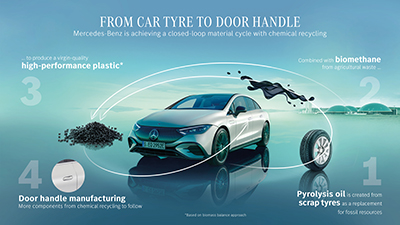| Plastics News |
BASF at K 2022: From scrap tire to door handle: Pyrolysis oil and biomethane enable production of mass-balanced plastics
November, 7, 2022 – BASF, Mercedes-Benz, Pyrum Innovations AG and WITTE Automotive announced to have successfully closed a material cycle to produce automotive components from mass-balanced plastics. Pyrolysis oil from scrap tires and biomethane from organic waste can replace fossil raw materials in manufacturing plastics with virgin material properties. Bow door handle made from mass-balanced Ultramid will start series production this year To produce the plastic for the bow door handle for selected Mercedes-Benz models, BASF combined alternative raw materials in a mass balance approach: pyrolysis oil generated at Pyrum Innovations AG from scrap tires and biomethane from agricultural waste and food industry residues. The resulting plastic, in this case, the Ultramid polyamide 6 with 30 percent glass fiber reinforcement, features the same properties as prime quality plastic making it the ideal material for demanding vehicle components. In line with an efficient circular economy, mass-balanced products will be used for bow door handles for the Mercedes-Benz S-Class and the EQE this year. “Solutions like these help our customers meet their sustainability goals,” explains Dr. Martin Jung, President of Performance Materials, BASF. “This is our Go!Create approach: we invite all our customers and partners to join us in shaping the path towards a circular economy with plastics. With this bow door handle for Mercedes-Benz, we have shown this in an exemplary way.” An independent certification following the REDcert2 scheme, verifies the quantities of pyrolysis oil and biomethane required to replace fossil raw materials for the end product. These certified raw materials are fed into BASF’s production network, are mathematically assigned to the plastics through the mass-balance approach and then delivered to the BASF customer WITTE Automotive. The subsequent production of the bow door handles at the automotive supplier is audited externally in the same way based on the REDcert2 standard. In addition, the jointly developed solution approach will be transferred to a crash absorber for the Mercedes-Benz S-Class. As component of the vehicle´s front end, the crash absorber contributes to an even reduction of forces acting on the other car in a frontal collision. In this case, again, a mass-balanced plastic compound based on pyrolysis oil and biomethane from BASF meets the high-quality requirements of Mercedes-Benz, particularly regarding crash safety, the companies claim. From plastic waste to new products By improving the production, use and recycling of plastics, the companies involved are one step closer to their sustainability goals. The project partners were recognized for the jointly developed solution as winners of the 2022 MATERIALICA Design + Technology Awards in the category Material in Berlin on October 5, 2022. The judges highlighted the collaborative approach along the value chain as essential for addressing the topic of sustainability. BASF focuses on the circular economy The BASF ChemCycling project targets plastic waste that is not recycled mechanically for technological, economic or ecological reasons. Together, mechanical and chemical recycling can increase recycling rates and contribute to a stronger circular economy for plastics. Both recycled and bio-based raw materials can replace fossil resources in production and help save CO2 emissions. Using a mass-balance approach audited by an independent third party, the proportion of recycled and/or biobased raw materials is allocated to products manufactured in the Verbund. These products are independently certified and have the same properties as those based on fossil resources. Customers can process and use them in the same way for demanding applications. BASF presents solutions for a sustainable plastics industry at K 2022 trade fair The partnership approach was presented at an expert talk with exhibits about this developmental approach at K 2022 in Düsseldorf. Interactive touchscreen applications showed the complete materials cycle and potential savings. Source: BASF
|


